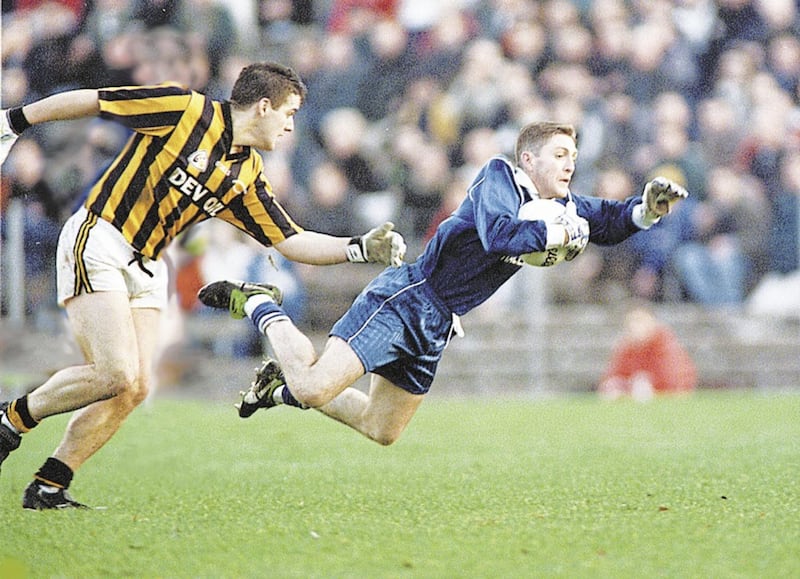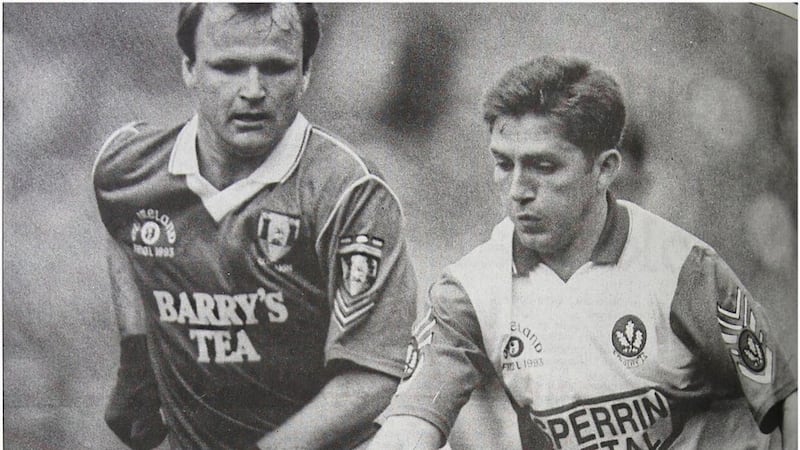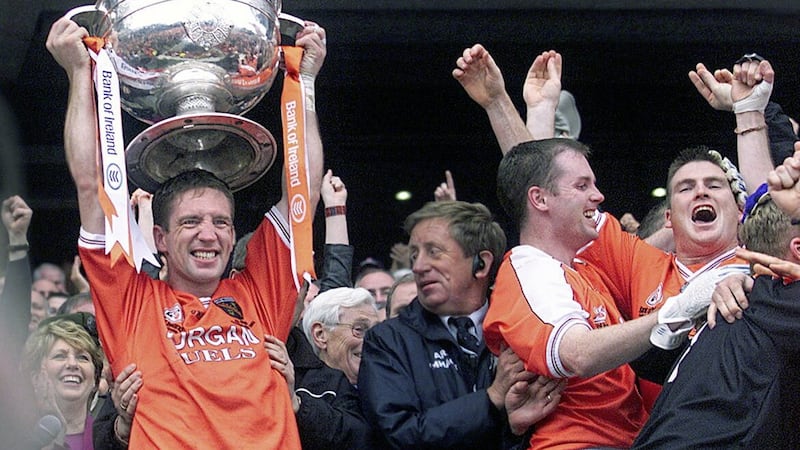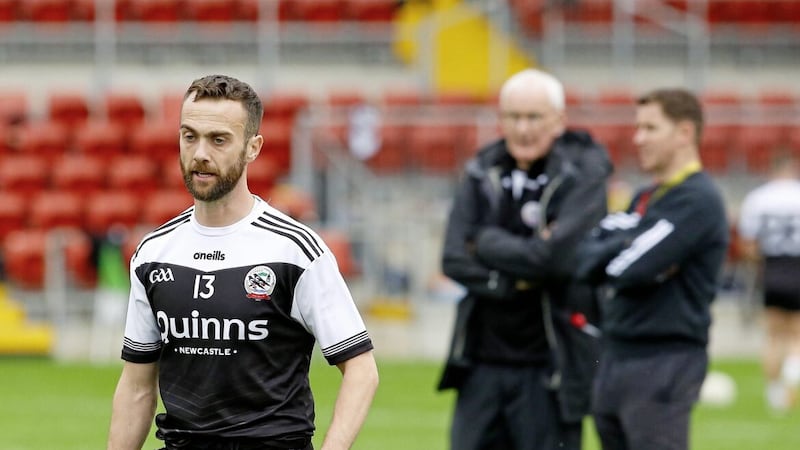NOVEMBER 1999. Eamonn Coleman lands at Damian Cassidy’s front door to find that he’s in Turkey for a week with a group of people with learning disabilities.
At 35, he was mulling over his playing days with Bellaghy. They’d won Derry, the middle one of three-in-a-row, but came unstuck against Enniskillen Gaels in the Ulster club semi-final.
“I could have stayed playing but the truth is I didn’t want to play away. Bellaghy won the Ulster club the following year and I’ve absolutely no regrets about that.
“I had a lot of niggly injuries – it was just sore to play football. I loved playing football but it’s not fun when it’s sore to do anything. Never mind Monday mornings, it was sore doing the f***ing warm-up. “
There was nothing unusual about Coleman landing out to Ballynease. The two had always been close since the first day Cassidy encountered the brains of the whole operation at a minor trial in Ballerin.
But this knock on the door was different.
Coleman, whose tenth anniversary falls on Monday, had come to ask if Cassidy would come and join him as part of the management team as the All-Ireland winning manager prepared for his second stint in charge. Adrian McGuckin was on board as well.
“I was gobsmacked. It was a massive compliment. To me, where I had Eamonn and Adrian at, I was chuffed to bits.
“I loved Eamonn because he watched football. If a score went at the far end, he’d be able to say ‘that’s the reason why’ and point 80 yards down the field.
“I frequently think about him. He’s a serious loss of a personality to Derry football. The knowledge that he had on players. You can’t beat someone who’s streetwise and knows how people tick.”
*****
THE ingredients for Derry’s All-Ireland success began to gather a decade and more before.
Cassidy was on the 1983 All-Ireland winning minor team and the under-21s in 1985, who reached the decider where they were beaten by Cork.
Both of those were under Coleman but he’d have to more than wait his turn for the big job.
They won another All-Ireland minor in 1989 and all the while, St Patrick’s Maghera were laying claim to permanent ownership of the MacRory Cup.
Adrian McGuckin and Oliver Short ran circuit classes at lunchtime, twice a week for three months. Cassidy, who did a bit of boxing in his youth, was called into the MacRory squad as a fourth year in 1981, joining Dermot McNicholl, who was the same age but had already been on it for a year.
They won five out of six between 1980 and ’85. Those years produced the like of Damien McCusker, Danny Quinn, Johnny and Collie McGurk, Henry Downey, Enda Gormley and a host of excellent fringe players that drove standards up.
Cassidy made his senior debut in a league game against Cavan late in ’83 and recalls that playing Kerry in the ’84 Centenary Cup was when he first recognised the level the top teams were operating at.
“I couldn’t get over the size of them. Mikey Sheehy was 5’10” and physically developed, and he was the smallest player they had.
“Sean Walsh’s leg was as big as I was. He had these quads that you could have fitted me into.”
Even though they won Ulster in ’87, it still took a long time after that before it all came together properly. His good friend McNicholl had palmed off Australia when he was 18 but did relent five years later. He returned in 1990 but the legacy was a groin injury that would haunt him.
“I remember seeing a photograph of him playing in a game and I could not get over the condition of him. Absolutely lines everywhere. Cut out, literally. Every muscle,”
Anthony Tohill came home from Melbourne the following year and Coleman was given the job. They won the National League in early 1992 and went on to reach the Ulster final, where they met Donegal.
A ‘toxic’ air, as Fergal P McCusker once described it, had developed overhead in meetings with the Tír Chonaill men.
“We lost that on the training pitch in Kilrea,” recalls Cassidy.
“We had a training session on that pitch and it was too much, too close to the game.
“Nothing’s ever perfect. Jim McGuinness has shown himself to be as shrewd as anybody, but he didn’t get it all right at the end of the day. Who does? There’s nobody perfect so let’s not be naïve about it.”
It didn’t help too that they lost Anthony Tohill to a broken foot at half-time, but while the Anglo Celt went to the hills, enough vigour was taken back to the Sperrins to encourage their efforts.
*****
CASSIDY skated across the puddles in the Ulster final in ’93, his best performance of that historic year.
In a recent social media poll run by Derry GAA, his score in the Ulster final was put forward as one of the five greatest in the county’s history.
Picking the ball up just outside the Donegal 45’, he carries straight until he’s 25 yards out. Looks like he’ll go on the right but as the defender dives in, the solo dummy comes. Drops it on the outside of the left and straight over.
They’d won in the Marshes, almost slipped up against Monaghan before getting over the replay, but it was Donegal that they really had eyes for.
Derry clawed the Ulster and All-Ireland titles out of their hands on the saturated bog at St Tiernach’s Park, but they showed they could more than match any team for football when August came.
Famous victories over Dublin and Cork brought Sam Maguire to the county for the first and only time. But with any successful side, there are always ones left behind.
The classic with Down the following year, in which he didn’t start, is always regarded as the one that got away for Derry. That loss to Donegal in ’92, a one-point defeat by Tyrone in a tumultuous ’95, they’re all there.
“You ask most players about their football career and what do they think about? Is it going up the steps of the Hogan Stand in ’93, or lifting the Ulster club in ’94, or winning MacRorys?
“F*****g sure it’s not the first thing comes into your head. The first thing that comes into your head are the ones that got away.
“If you ask me about football, I’ll think about the All-Ireland club that got away, the Derry-Down game that got away, the championship that Clonoe threw away in 2011 with a chance to kick the ball over from 21 yards.
“Those are things I think about, and I guarantee that’s what 90 per cent of players will think about. That’s just human nature.”
There was that All-Ireland club final which went past in 1995 too, with Cassidy missing a stoppage-time penalty on a day when they missed a glut of second half goal chances as the wind and rain blew hoardings off the Cusack Stand in Croke Park.

Enough medals to sustain, though. And when Coleman knocked the door in November ’99, there was only ever going to be one answer.
Derry reached the Ulster final in 2000 only to lose to Armagh but losing a nine-point lead against Antrim in the semi-final and needing a replay to get over it proved costly.
“We were up, up, up for games. And we needed to come down. The last thing we needed was a draw against Antrim.
“We were cruising and we simply arsed about. No disrespect to the Antrim players involved, they’ll take their view on that day, but we just walked out and played the second half as if the game was over.
“That downtime was massively important for us but the replay came in the middle of it. That’s where that Ulster was lost.”
The introduction of the qualifiers the following year allowed them to recover from a pasting by Tyrone to turn the tables on them in the All-Ireland quarter-final.
A semi-final against Galway and when Tohill kicks his first of the day with 18 minutes to go, Derry lead by 1-10 to 0-8. One more score would have done but instead the Tribesmen get on a run and Matthew Clancy’s goal swings the game.
Cassidy thought the mentality after that defeat would be just like the winter of ’92.
“I made the assumption that our players would come back in 2002 realising we are so close to it. Martin McElkennon was there, a top man.
“And they just did not want to know. The amount of bullshit excuses. They didn’t want to put themselves out there and go for it.”
Tyrone got their own back in a third round qualifier in 2002 and that was that. For then, anyway.
*****
ON Saturday, Derry play Kildare in Owenbeg. Instantly the memories of 2010 flood back.
After a spell with Loughmacrory, he took his native Bellaghy to Derry success and an Ulster final in 2005, then Clonoe O’Rahilly’s to victory in the 2008 Tyrone championship, becoming the natural successor to Paddy Crozier.
Derry had won the National League in '08 but fell flat in the Ulster semi-final when Barry Owens fisted home a late goal.
Many of that team had played in an All-Ireland semi-final in 2004 under Mickey Moran and when he took over ahead of the ’09 season, Cassidy felt that an Ulster title was still there.
His first championship game in charge, they had a gutsy win over a Monaghan side that had bullied them in previous years, but just like in the past they couldn’t back it up. All-Ireland champions Tyrone were too good for a Derry side without half a dozen starters.
“I wasn’t naïve when I went in because I knew that the team didn’t have it in them to win an All-Ireland, and how could you be foolish enough to think that when they couldn’t put games back-to-back in Ulster for so many years before it?
“That meant we didn’t have the players. But we had a number of good players and I felt there was potentially an Ulster title in it.
“I knew to do that, it was a short-term fix and I knew that a lot of the players were very close to tipping over it. I knew at the end of the first year that that tipping point had arrived already.
“Derry didn’t have enough personalities who were driven enough to be driven to success. That’s the bit that horrified me the most when I got into the midst of it.
“It’s very disappointing for people like Enda [Muldoon], Sean Marty [Lockhart] and Fergal [Doherty], three genuine warriors over the years. But you need a lot more than three. Three’s not enough.”
They lost to Armagh in Ulster the following year and when Kildare, who would go on to reach the All-Ireland semi-final, came to Celtic Park, the gulf in class in a 2-17 to 1-9 defeat left Cassidy sure it was time to go.
“I had quite a long conversation with people I’d have a lot of respect for about whether I should even go the second year or not. I just knew it wasn’t there.
“But the other side of it is how often will you get an opportunity to take your county team? It is a tremendous honour and you work with some tremendous people, in terms of county board and people outside of it supporting the county team, and the players who were there committing to it fully. All those people deserve respect.”
He doesn’t rule out the idea of returning some time in the future, but right now there’s plenty to do between Cargin and the day job.
Having trained as a special needs nurse and then a social worker, he manages Kilcreggan Homes, which offers social housing and independence to people with learning disabilities or on the autistic spectrum. It has the north’s only urban farm and the inhabitants are empowered by being given jobs to do around the place.
There won’t be many coming torturing him to talk about Gaelic football in around the back of Elizabeth Avenue in Carrickfergus, but it’s an operation you have to see to appreciate.
And there’s a revolution to keep an eye on in Bellaghy. Their footballers, with son Peter playing, and camogs, with daughters Anna and Sarah who have spent a lot of years being coached by their father, are both catching up rapidly.
His brother Joe, 12 years his junior and a former Oak Leaf player himself, is the man at the helm now and on any given Sunday at Páirc Sean dé Brún, their father Dan Joe is stood at the post umpiring at 82 years of age. The family is steeped in it, their sole sister Joanne having helped found the Loup’s camogie club where she is now chairperson.
A streak of innate self-confidence is part of their genetic make-up. But for Damian Cassidy, it was all part of the act that helped him achieve almost everything he’s wanted on the football field.
“I never saw myself as a particularly good footballer. That’s being honest with you.
“You do the whole bravado thing. You act the big lad, you bum and blow and take the hand out of boys around the club, that craic. That’s all it is, is craic.
“But at the heels of the hunt, I never saw myself as a top player. No, never. I’m just particularly grateful to have been born at the time I was born at.”








